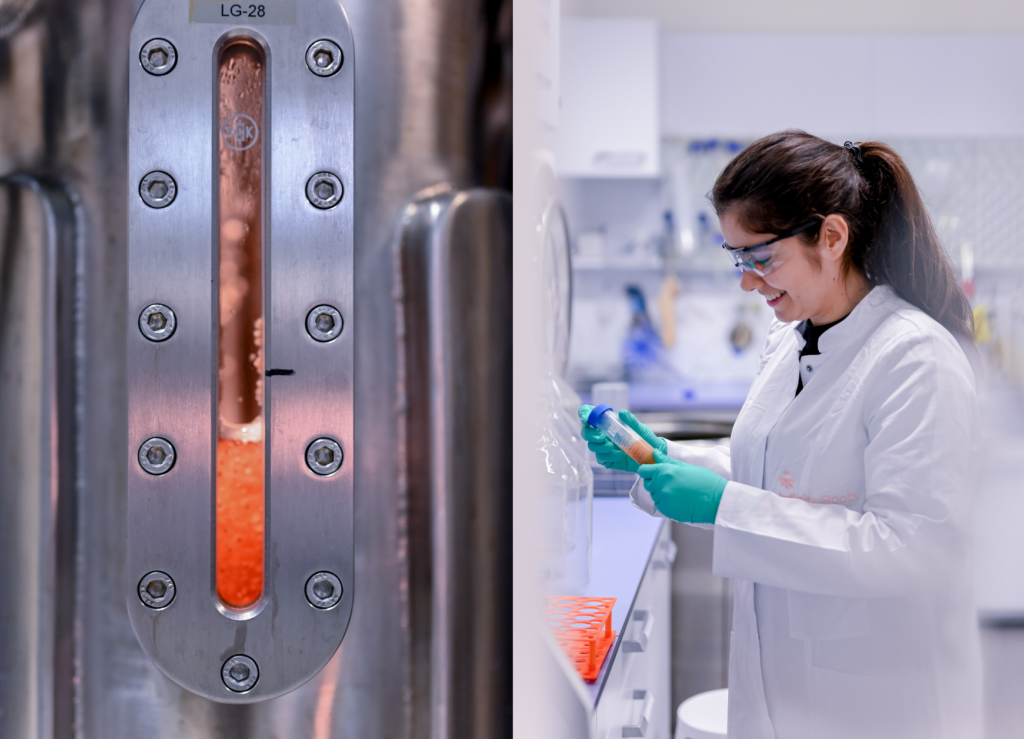German Ministry Grants €2.6M to Project Upcycling Dairy Waste Into Mycelium Protein
4 Mins Read
Infinite Roots and the Hamburg University of Technology have received a €2.6M grant from the German government to develop tech that transforms whey into a feedstock to grow mycelium.
As mycelium protein mushrooms in popularity, the German government is backing a new project to tackle the massive amount of waste created by the dairy industry, and turn it into a valuable ingredient with fungi.
The Hamburg University of Technology (TUHH) and local food tech startup Infinite Roots have been awarded a €2.6M ($2.8M) grant by the federal food and agriculture ministry (BMEL) to develop technology that can upcycle whey – the liquid left over after milk is curdled and strained – into a feedstock for mycelium fermentation.
The funding was authorised by the parliament via the federal office for agriculture and food (BLE), the central implementing authority and project management arm of the BMEL, under the national innovation support scheme.
Why Infinite Roots is aiming to upcycle whey

By volume, whey is the largest byproduct of the dairy sector. Around 80-90% of milk that enters cheese manufacturing facilities ends up as whey. And globally, between 180 and 190 million tonnes of whey are produced annually.
Not all of this goes to waste – about half is processed into added-value products like whey protein, functional foods, edible films and coatings, and lactic acid. But not enough is repurposed either, and whey disposal is a costly process, both in terms of economics and the environment.
Its biochemical and chemical oxygen demands are significantly higher than wastewater, which poses an environmental challenge. Meanwhile, if not disposed of properly, whey can contaminate groundwater and present risks to farmland.
This is what the German government is hoping to address with its grant. The project aims to create a technology that can use whey as a feedstock for mycelium growth, which in turn would be used for novel ingredients and products. Mycelium is the root-like structure of edible mushrooms, comprising a network of tiny thread-like cells that grow underground to form an intricate web of connections. It’s a fast-growing market, set to cross $6.5B by 2032.
Infinite Roots already uses industry sidestreams – spent grain from beer brewing – to grow mycelium for its own meat analogues. “Whey protein is an exciting alternative that opens the door to unique flavour profiles, though it does require fine-tuning our fermentation process to ensure that the mycelium can efficiently absorb the nutrients,” a company representative tells Green Queen.
“Whey also brings the advantage of being a relatively low-cost byproduct, which could help drive down production costs in the future. For now, we’re focused on investing in new research, fermentation technologies, and processes to perfect the concept.”
Mycelium meat on the horizon with impending EU regulatory approval

Infinite Roots is working towards commercialising its vegan meat range, and says the whey project is in its research phase and currently only requires limited quantities of the protein from local dairies.
“Our current product lineup is vegan, but any future products that incorporate whey will not be classified as such. That said, with whey as a feedstock, we see the potential to create highly nutritious, protein-rich foods,” the spokesperson adds.
The project will offer a solution to waste disposal and create new revenue streams for what it calls an abundant byproduct, turning sour whey into a valuable resource. “Our upcycling technology will not only optimise the fermentation process, but also turn a problematic waste product into a valuable resource, saving time, reducing costs, and introducing sustainable practices into the food industry,” says Infinite Roots CEO Mazen Rizk.
It is among a number of mycelium companies teaming up with the animal protein industry. US startup Bolder Foods is selling a semi-finished mycelium product to cheese and dairy manufacturers, Finnish player Enifer is also using a dairy byproduct as a mycelium feedstock for human food, feed and aquaculture applications, and industry giant Quorn is supplying its mycoprotein (a mycelium-based protein) as part of burgers and sausages blended with meat for UK hospitals.
TUHH is simultaneously leading an educational drive involving young researchers to promote awareness around upcycling and sustainable food technology, which Rizk says adds an “exciting” dimension to the project. “We’re not just developing new technologies; we’re inspiring future innovators in sustainable food production,” he notes.
Infinite Roots says the fusion of mycelium and whey could offer “intriguing health benefits, thanks to the complementary nature of these ingredients”. Its current ingredient – the one using spent grain from Bitburger Brewery (an investor in the business) – is in its final stages of development and expected to launch in the coming months.
“We’re already in talks with food manufacturers, with plans for an initial rollout in select product categories before scaling up further,” the spokesperson says.
The startup, which has raised $73M to date, has already achieved self-affirmed Generally Recognized as Safe (GRAS) status in the US and notified the FDA to receive a ‘no questions’ letter, although it isn’t considered a novel food, since it only uses edible mushroom strains. “We’re in the final steps of securing clearance for market entry in Europe,” its representative says, “while in Asia, we’re already set to offer our products to consumers.



